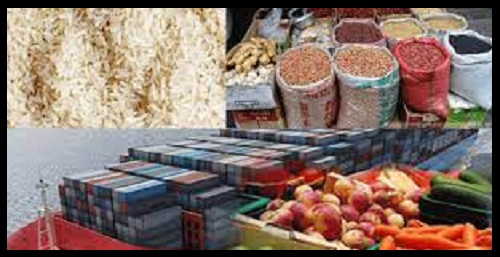
Approved food items exported from Nigeria to the U.K.
Approved food items exported from Nigeria to the U.K. – Have difficulties sending food from Nigeria to the UK and other nations? Do you want a dependable, affordable way to export food from Nigeria to the UK and other Countries? Also, have there ever been problems knowing the approved food items you can export to the UK? If you answered “Yes” to any of the questions above, this post is for you. However, Nigeria will benefit from the United Kingdom’s new developing countries trading scheme (DCTS), announced by international trade secretary Anne-Marie Trevelyan in early 2023. With the implementation of the project, 99 percent of the total goods exported from Nigeria are now eligible for duty-free entry into the country.
Contents
- 1 Cessummit Business Tips:
- 1.1 Approved food items exported from Nigeria to the U.K.
- 1.2 What is Food items export?
- 1.3 Food Safety for export:
- 1.4 Approved food items exported from Nigeria to the U.K.
- 1.5 Food items exported from Nigeria to the U.K.
- 1.6 Approved food items exported from Nigeria to the U.K.
- 1.7 How to export palm oil from Nigeria to UK?
- 1.8 Approved food items exported from Nigeria to the U.K.
- 1.9 How to get buyers for export from Nigeria?
- 1.10 Approved food items exported from Nigeria to the U.K.
- 1.11 How can i export crayfish from Nigeria to US and UK?
- 1.12 Approved food items exported from Nigeria to the U.K.
- 1.13 And, generally, how can I start a foodstuff export business in Nigeria?
- 1.14 Approved food items exported from Nigeria to the U.K.
- 1.15 Approved food items exported from Nigeria to the U.K.
- 1.16 Approved food items exported from Nigeria to the U.K.
- 1.17 Read Also:
- 1.18 Summing Up:
- 1.19 Share this:
- 1.20 Like this:
Cessummit Business Tips:
Cessummit.com ensures that you have access to business information at your fingertips. On the other hand, you can contact us to work on your business ideas. However, for our mentorship programs and business development department will assist you in completing this task at a low cost. Get help today and contact us right away.
Approved food items exported from Nigeria to the U.K.
What is Food items export?
Food items export refers to the process of sending food products, such as fruits, vegetables, grains, meat, dairy, and processed food items, to other countries for consumption or commercial purposes. Food items export is an important part of international trade and allows countries to access a wider range of food products that they may not be able to produce themselves. It also provides an opportunity for food producers and manufacturers to expand their markets and increase their profits. However, food items export is subject to various regulations and standards related to food safety, quality, and labeling, which must be met to ensure the products are safe and fit for consumption.
Food Safety for export:
Food safety is a crucial aspect of food items export, as the products need to meet international standards and regulations to ensure they are safe and fit for consumption. Here are some key factors that contribute to food safety in the context of food items export:
- Compliance with international regulations: Food items exporters must comply with international regulations and standards related to food safety, such as those set by the World Health Organization (WHO), the Food and Agriculture Organization (FAO), and the International Organization for Standardization (ISO). These regulations cover various aspects of food safety, including labeling, packaging, and hygiene practices.
- Risk assessment and management: Exporters must conduct risk assessments to identify potential hazards associated with their products and take steps to manage those risks. This may involve implementing food safety management systems, such as Hazard Analysis and Critical Control Points (HACCP), to control and monitor the safety of their products throughout the supply chain.
- Traceability: Exporters must have systems in place to track their products throughout the supply chain, from production to distribution. Also, this enables them to quickly identify and respond to any food safety issues that may arise.
- Training and education: Exporters must provide training and education to their staff to ensure they understand and follow food safety practices. This includes training on hygiene practices, food handling and storage, and risk management.
- Collaboration with stakeholders: Exporters must work closely with their suppliers, transporters, and distributors to ensure that food safety is maintained throughout the supply chain. This may involve sharing information and best practices, conducting audits, and implementing corrective actions when necessary.
Approved food items exported from Nigeria to the U.K.
However, by implementing these measures, food items exporters can ensure that their products meet international standards and regulations for food safety, which is essential for protecting public health and maintaining consumer confidence in the safety and quality of their products.
Food items exported from Nigeria to the U.K.
Nigeria is known for exporting various food items to different countries, including the United Kingdom (U.K.). Some of the popular food items exported from Nigeria to the U.K. include:
- Cocoa beans: Nigeria is one of the largest producers of cocoa beans in the world and exports a significant amount of this commodity to the U.K., which is a major consumer of chocolate products.
- Cashew nuts: Cashew nuts are another important export crop for Nigeria, and the U.K. is one of the top importers of this product. Nigerian cashew nuts are known for their high quality and are used in a variety of food products.
- Sesame seeds: Nigeria is one of the largest producers of sesame seeds in the world, and the U.K. is a major importer of this commodity. Sesame seeds are used in a variety of food products, including bread, snacks, and sauces.
- Shea butter: Shea butter is a popular cosmetic ingredient that is also used in food products. Nigeria is a major producer of shea butter and exports this product to the U.K.
- Spices: Nigeria is known for its diverse range of spices, including ginger, turmeric, and chili peppers, which are exported to the U.K. and used in a variety of food products.
Approved food items exported from Nigeria to the U.K.
It is important to note that food items exported from Nigeria to the U.K. must meet the U.K. food safety regulations and standards, including labeling, packaging, and hygiene practices. Additionally, exporters must comply with any relevant import regulations and obtain the necessary certifications and permits.
How to export palm oil from Nigeria to UK?
Exporting palm oil from Nigeria to the UK requires several steps to ensure that the process is legally compliant and the product meets the required standards. Here are the general steps to follow:
- Obtain necessary licenses and permits: The first step is to obtain the necessary licenses and permits from relevant Nigerian government agencies, such as the Nigerian Export Promotion Council (NEPC), National Agency for Food and Drug Administration and Control (NAFDAC), and the Nigerian Customs Service. These agencies will ensure that the palm oil meets the required standards and is safe for consumption.
- Identify potential buyers: The next step is to identify potential buyers in the UK. This can be done through various channels such as trade fairs, exhibitions, online marketplaces, and trade directories. It is important to research potential buyers to ensure they have a good reputation and are reliable.
- Negotiate terms: Once potential buyers have been identified, the exporter must negotiate the terms of the sale, including price, quantity, packaging, and delivery.
- Process the order: After the terms have been agreed upon, the exporter must process the order, including preparing the palm oil for shipment, arranging for transport, and completing the necessary documentation.
- Ship the palm oil: The palm oil can be shipped via air or sea freight, depending on the volume and urgency of the order. It is important to ensure that the palm oil is properly packaged, labeled, and transported in compliance with the relevant regulations and standards.
- Receive payment: Once the palm oil has been delivered to the buyer, the exporter can receive payment through various methods such as wire transfer, letter of credit, or cash in advance.
Approved food items exported from Nigeria to the U.K.
However, it is important to note that exporting palm oil from Nigeria to the UK requires compliance with the relevant regulations and standards, including labeling, packaging, and quality control. Also, it is advisable to work with experienced export agents or freight forwarders to ensure that the process is smooth and compliant with the necessary regulations.
How to get buyers for export from Nigeria?
Getting buyers for exports from Nigeria requires a well-planned approach that involves understanding the target market, identifying potential buyers, and building relationships with them. Here are some steps to follow:
- Conduct market research: The first step is to research the target market and understand the demand for the product. This involves analyzing market trends, consumer preferences, and competition. This information will help in determining the potential buyers and how to reach them.
- Identify potential buyers: Once the target market has been identified, the next step is to identify potential buyers. This can be done through various channels such as trade fairs, exhibitions, online marketplaces, and trade directories. It is important to research potential buyers to ensure they have a good reputation and are reliable.
- Build relationships: Building relationships with potential buyers is essential in securing export deals. This involves communicating with them, understanding their needs, and providing solutions that meet their requirements. It is important to establish trust and credibility to build a long-term relationship.
- Market the product: Marketing the product is crucial in attracting potential buyers. This can be done through various channels such as social media, email marketing, and advertising. It is important to highlight the unique selling points of the product and its benefits to the buyer.
- Provide quality products and services: Providing quality products and services is essential in building a good reputation and attracting repeat customers. This involves ensuring that the products meet the required standards, are properly packaged, and delivered on time.
- Work with experienced export agents: Working with experienced export agents or freight forwarders can help in securing export deals and navigating the complex export regulations and documentation.
Approved food items exported from Nigeria to the U.K.
In summary, getting buyers for exports from Nigeria requires a strategic approach that involves understanding the target market, identifying potential buyers, building relationships, marketing the product, providing quality products and services, and working with experienced export agents.
How can i export crayfish from Nigeria to US and UK?
Exporting crayfish from Nigeria to the US and UK requires compliance with the relevant regulations and standards, including labeling, packaging, and quality control. Here are the general steps to follow:
- Obtain necessary licenses and permits: The first step is to obtain the necessary licenses and permits from relevant Nigerian government agencies, such as the Nigerian Export Promotion Council (NEPC) and the National Agency for Food and Drug Administration and Control (NAFDAC). These agencies will ensure that the crayfish meets the required standards and is safe for consumption.
- Identify potential buyers: The next step is to identify potential buyers in the US and UK. This can be done through various channels such as trade fairs, exhibitions, online marketplaces, and trade directories. It is important to research potential buyers to ensure they have a good reputation and are reliable.
- Negotiate terms: Once potential buyers have been identified, the exporter must negotiate the terms of the sale. This including price, quantity, packaging, and delivery.
- Process the order: After the terms have been agreed upon, the exporter must process the order. This including preparing the crayfish for shipment, arranging for transport, and completing the necessary documentation.
- Ship the crayfish: The crayfish can be shipped via air or sea freight, depending on the volume of the order. Ensure that the crayfish is properly packaged, labeled, and transported in compliance with the relevant regulations and standards.
- Receive payment: Once the crayfish has been delivered to the buyer, the exporter can receive payment through various methods such as wire transfer, letter of credit, or cash in advance.
Approved food items exported from Nigeria to the U.K.
Note that exporting crayfish from Nigeria to the US and UK requires compliance with the relevant regulations. This includes labeling, packaging, and quality control. It is advisable to work with experienced export agents or freight forwarders to ensure that the process follows necessary regulations.
And, generally, how can I start a foodstuff export business in Nigeria?
Starting a foodstuff export business in Nigeria requires careful planning and execution. Here are the general steps to follow:
- Conduct market research: The first step is to conduct market research to identify potential export markets and products. This involves analyzing market trends, consumer preferences, and competition.
- Identify the products to export: After identifying the potential export markets, the next step is to select the product. However, it is advisable to focus on products that have high demand, and have a competitive advantage.
- Register your business: Register your business with the Corporate Affairs Commission (CAC). Also, obtain the necessary licenses and permits from relevant Nigerian government agencies, such as the Nigerian Export Promotion Council (NEPC) and the National Agency for Food and Drug Administration and Control (NAFDAC).
- Build relationships with suppliers: Building relationships with suppliers is essential in securing a steady supply of quality products. However, this involves sourcing products from reliable suppliers, negotiating favorable prices, and ensuring consistent quality.
- Establish relationships with buyers: Establishing relationships with potential buyers is essential in securing export deals. Also, this involves communicating with them, understanding their needs, and providing solutions that meet their requirements. It is important to establish trust and credibility to build a long-term relationship.
Approved food items exported from Nigeria to the U.K.
6. Develop a marketing strategy: Developing a marketing strategy is crucial in attracting potential buyers. This can be done through various channels such as social media, email marketing, and advertising. It is important to highlight the unique selling points of the products and their benefits to the buyer.
7. Ensure compliance with regulations: Compliance with regulations is essential in exporting foodstuff from Nigeria. This involves ensuring that the products meet the required standards, are properly labeled. It must comply with the relevant regulations and documentation.
8. Work with experienced export agents: Working with experienced export agents or freight forwarders can help in securing export deals. Also it navigating the complex export regulations and documentation.
Approved food items exported from Nigeria to the U.K.
In summary, starting a foodstuff export business in Nigeria requires careful planning and execution. It involves conducting market research, identifying potential export markets and products, registering the business. Also, building relationships with suppliers and buyers, developing a marketing strategy, in compliance with regulations, and working with experienced agents.

Approved food items exported from Nigeria to the U.K.
Read Also:
- Profitable Business Planning for Startups
- Business Planing Process for Scale-ups
- Business planning process: Approved Checklist
- Other feasibility factors
- The objectives of feasibility study
- Apply for Mentorship
- Endorsed business planning quotes for all
Summing Up:
Finally, on Approved food items exported from Nigeria to the U.K. This post will show you the foods that are allowed into the U.K and those that are not. You will also learn how the export business works. Furthermore, reach us at +234 905 313 0518 or cessummit0518@gmail.com for Business plans, CAC documentation, and more.






